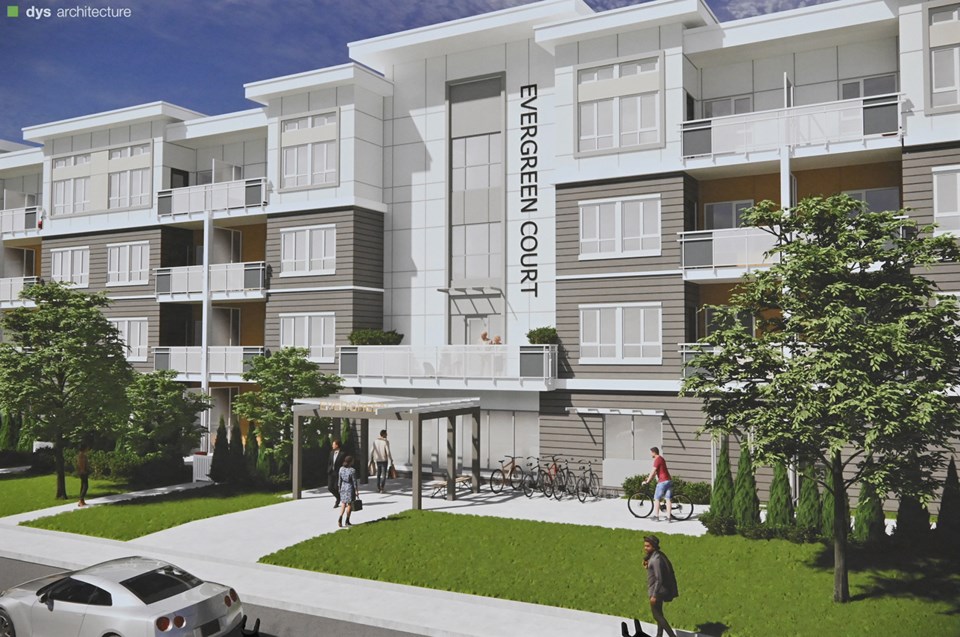It was a big announcement in the City of Delta regarding a priority housing project, but will a city plan be able to encourage more such projects in the next few years?
Last Friday, Delta MP Carla Qualtrough, Minister of Housing and Diversity and Inclusion Ahmed Hussen, acting mayor and Delta Coun. Dylan Kruger and Affordable Housing Societies CEO Stephen Bennett were on hand at the Evergreen Court affordable housing development site in Ladner.
They announced the Government of Canada is contributing $34.7 million for the project. The province is contributing approximately $7.3 million from the Building BC: Community Housing Fund for the project. Affordable Housing Societies is contributing the land, valued at $12.4 million plus additional equity of $7.6 million and will develop, own and operate the project. The city is contributing $790,000 through waiver fees and Metro Vancouver is waiving $458,000 in development cost charges.
City council this summer gave final approval for a two-phase, 198-unit non-market housing redevelopment.
The project for seniors, families and inclusive housing for persons with intellectual disabilities will be located at 4603, 4625 and 4649 Evergreen Lane.
The project involves consolidating and redeveloping the properties with the first phase including 130 seniors housing units in a four-storey apartment building on the north portion of the site. There will be 10 units which would be made available for individuals with intellectual disabilities.
The second phase includes 68 family housing units in a 48-unit four-storey apartment building and a 20-unit three storey townhouse building on the southern portion of the site.
Written two years ago, the Delta Housing Needs Assessment, which guided the formation of the new Delta Housing Action Plan, notes that Delta households in “core” and “extreme core” needs increased over the 2006 to 2016 period, particularly for renting households.
Data from BC Housing also shows that wait lists for non‑market housing are getting longer, especially for families and seniors, indicating that that more and more people need housing support.
The housing needs assessment also notes that among the findings of a survey was a need for supportive housing for all ages and abilities, including seniors and those with developmental disabilities, as well a need more affordable/subsidized housing for those with lower incomes.
The key challenges include availability of land, non-profit capacity to develop and operate housing, availability and access to capital and operating funding, as well as market pressures. Other challenges identified include a lack of policies protecting existing affordable supply, considerations of community character, servicing constraints, as well as community resistance to new housing projects
Endorsed by council last fall, the housing action plan notes the city has identified a need for non-market and below market rental rates to address issues of affordability.
“Affordable units that are below market rents are challenging to build because the cost of land and construction can make these projects financially unfeasible or unattractive from an investment standpoint. These types of affordability levels are typically provided by non-profit housing providers and require different types of supports and incentives from local governments, as well as from the provincial and federal governments,” the report notes.
The plan goes on to note, “As of 2016, there were 2,140 households in Core Housing Need in Delta. This means they face a housing challenge—such as unaffordability, overcrowding, or housing in need of major repairs—and can’t afford the median rent in the community, meaning they can’t afford to move within Delta.”
The plan contains a series of recommended strategies including exploring ways to increase land availability for priority housing, identifying city and community-owned lands that could accommodate housing, incentives, increasing the number of accessible units in Delta and incentivizing and regulating the number of accessible units in new construction.
The plan also calls for the city to work with partners across the housing sector to increase Delta’s support of those needing a little extra help.
“Local governments play an important role in the housing system and have been taking a more hands-on approach over the last ten to fifteen years. However, the housing system is complex and there are many different actors involved in regulating, funding, and delivering housing, including the federal and provincial governments, private developers, non-profit housing providers, financial institutions, and others,” the report notes.
The report adds that for any given project, local governments may come as active partners by contributing land or capital dollars, or as supporting partners by expediting approvals or providing incentives. Local governments may also convene partnerships, develop avenues for investment in housing, support research and innovation or use traditional planning tools such as Official Community Plans, zoning and land use regulations to encourage needed housing types.
In most cases, local governments are not directly involved in the building or operating of housing or associated support services and ventures, as those roles are played by non-profits, developers, and provincial and federal governments.
The strategies outlined in the action plan are intended to be implemented over five years.
- With files by Mark Booth/Delta Optimist



